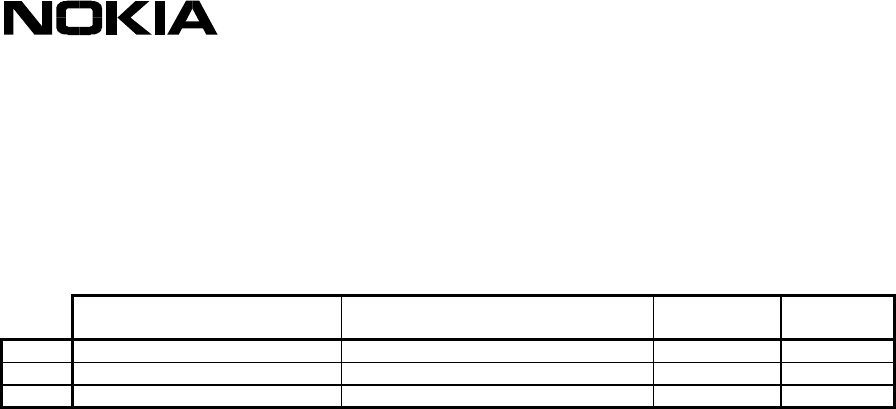
46
List of AT Commands for Nokia 22
Copyright © Nokia Mobile Phones 2001. All rights reserved.
<type> type of address octet in integer format (refer GSM 04.08 10.5.4.7):
129 unknown/telephony
145 international/telephony
7.10 +CUSD Unstructured supplementary service data
Command Response Default +cme
error
Set
+CUSD=<n>,<str>,<dcs> +CUSD: <m>[,<str>,<dcs>] 0[,,0] x
Read
+CUSD? +CUSD: <n>
Test
+CUSD=? +CUSD: (0,1)
The +CUSD command allows the controlling of the Unstructured Supplementary Service Data
(USSD) according to GSM 02.90. Both network and mobile initiated operations are supported. The
parameter <n> is used to disable and enable the presentation of an unsolicited result code
(network initiated operation) +CUSD: <m>,<str>,<dcs>.
When <str> is given, a mobile initiated USSD-string or a response USSD-string to a network
initiated operation is sent to the network. In the case of a successful mobile initiated operation, the
response USSD-string coming from the network is returned before the final result code.
The test command returns the supported values.
Defined values
<n> sets/shows the result code presentation status:
0 disable
1 enable
<str> string type USSD-string (when <str> parameter is not given, the network
is not interrogated):
- if <dcs> indicates that the GSM 03.38 default alphabet is used:
- if the TE character set is not "HEX" (refer to the Select TE Character
Set +CSCS command): the Nokia 22 converts GSM alphabet into the
current TE character set according to the rules of GSM 07.05, Annex A
- if the TE character set is "HEX": the Nokia 22 converts each 7-bit
character of the GSM alphabet into two IRA character long hexadecimal
numbers (e.g. character Π (GSM 23) is presented as 17 (IRA 49 and
55))
- if <dcs> indicates that a 8-bit data coding scheme is used: the Nokia
22 converts each 8-bit octet into two IRA character long hexadecimal
numbers (e.g. octet with integer value 42 is presented to the TE as two
characters 2A (IRA 50 and 65))
<dcs> GSM 03.38 Cell Broadcast Data Coding Scheme in integer
format (default 0)


















